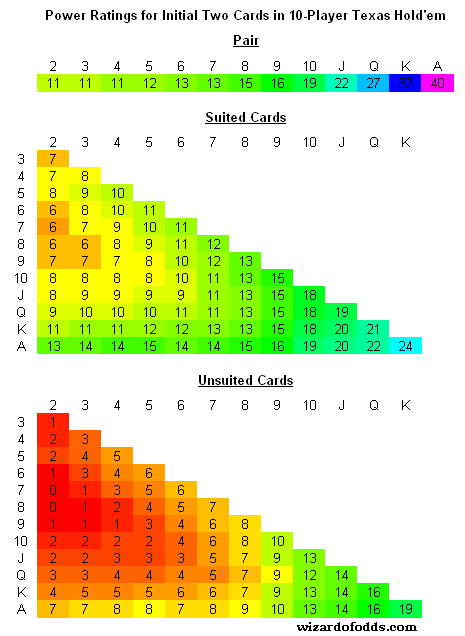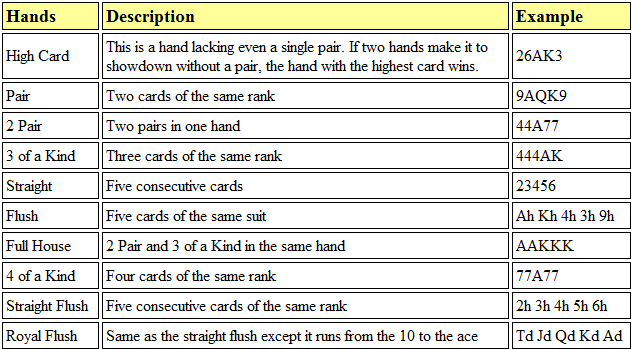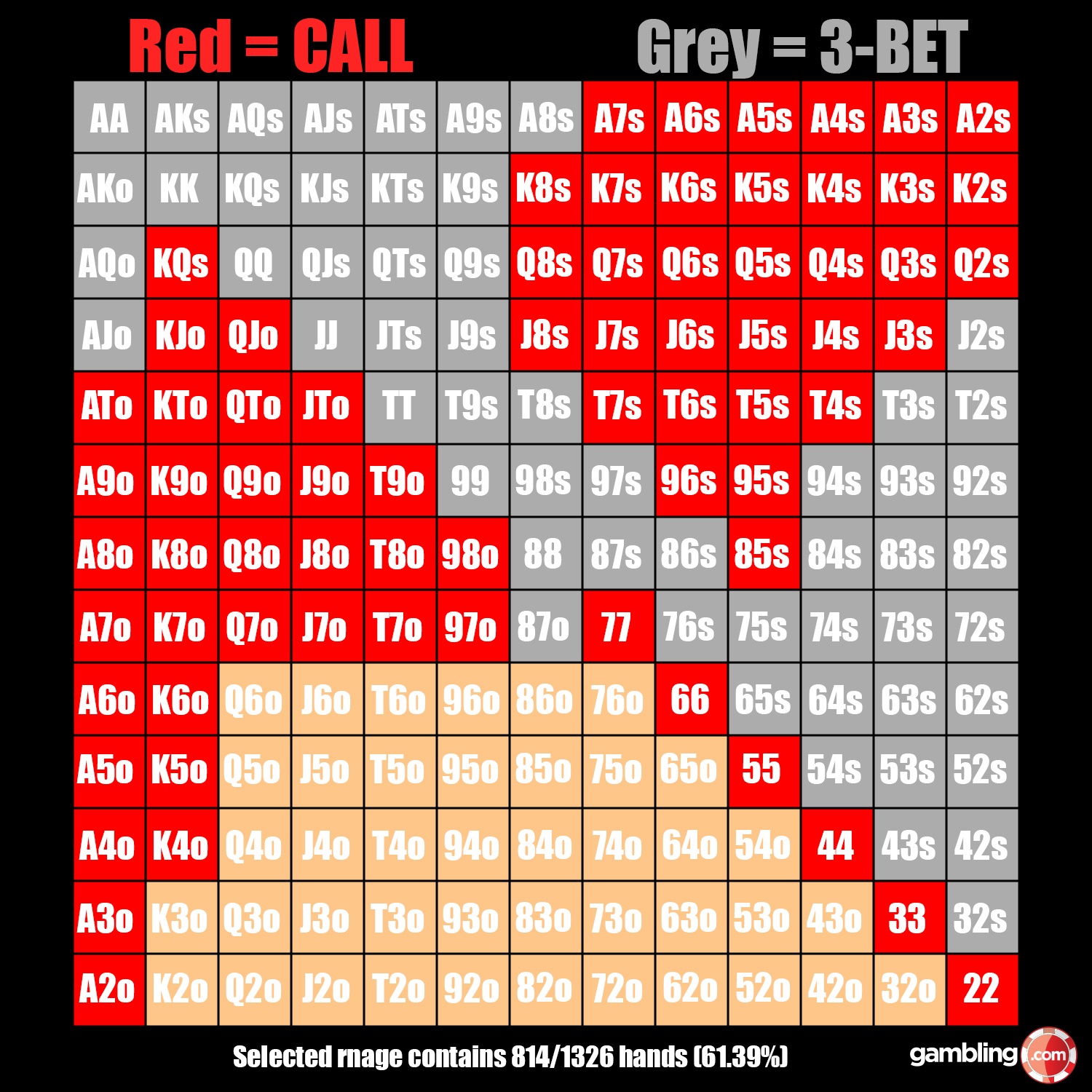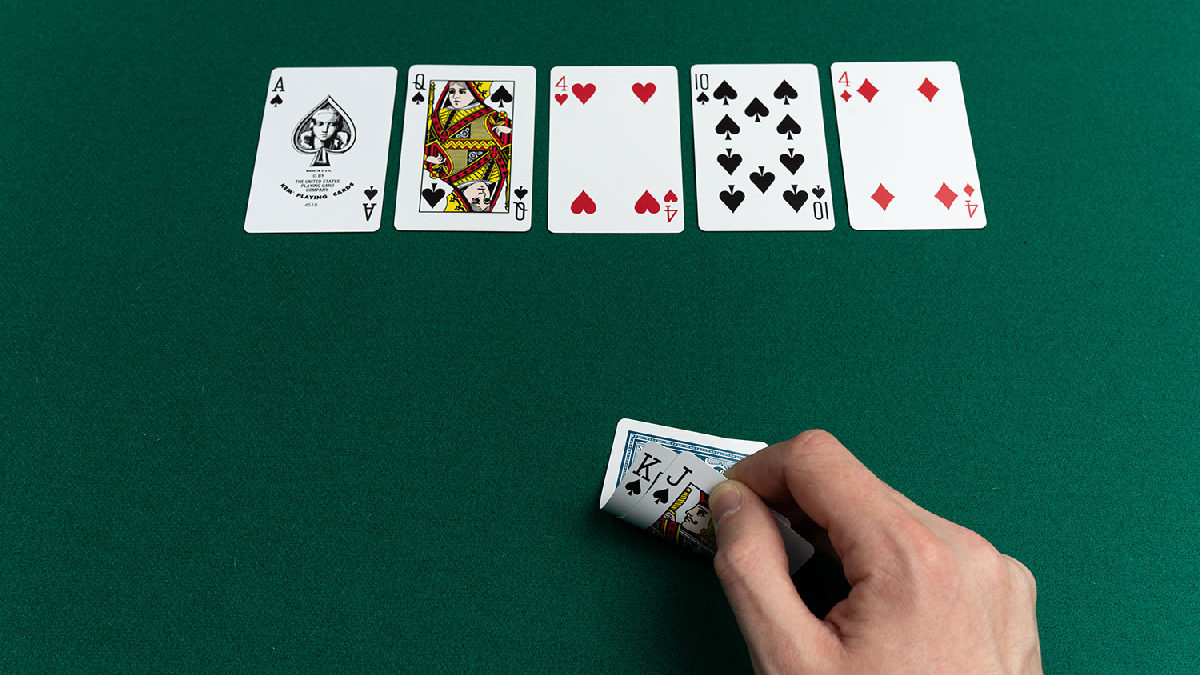Winning Hands In Texas Holdem
How to Determine the Winning Hand in Texas Hold’em
The first thing players brand new to poker have to learn is how to read the board or five “community cards” in order to determine the winning hand in Texas hold’em. The most important thing to remember is that when making your hand you use the best five cards available among the seven total cards — that is, your two hole cards plus the five cards on the board.
In hold’em you can use any five cards out of the seven to make your hand — in fact, you don’t even have to use the two hole cards which were dealt to you! This is called “playing the board,” and it happens if your best five-card poker hand is the one which is on the board in front of you.
For example, if you get dealt pocket aces and the board is , your best hand is the nine-high straight on the board in front of you — in other words, your aces don’t even play. In this case, you will chop the pot with your opponent when it comes to showdown unless of course the other player has or and makes a better straight.
- Texas Hold’em: The best starting hand is a pair of Aces. A pair of aces (also known as pocket rockets) are a favourite pre-flop over any other starting hand and is.
- Every beginning player, therefore, needs to understand the poker hand rankings to determine the strength of each player’s hand and, subsequently, the winner. In this guide, we present the Texas Hold’em hands order of value, from bottom to the highest hand in poker (the rankings apply to Omaha too).

Kicker problems
Another thing to bear in mind is that even with your one-pair hands — where most new players attention only to the pair they have — you need to be aware of the value of your total five-card hand.
Print out this free poker hand rankings chart – and always know the best winning poker hands. Poker hands are ranked in order from best to worst. Royal Flush An ace high straight flush. Straight Flush Five consecutive cards in the same suit. Four of a Kind Four cards of the same rank.
For example, say you have and the board reads . That means your best five-card hand is A-A-10-7-5 — that is, the pair of aces plus the three highest other cards available, the ten, the seven, and the five. In this hand if you put your opponent on a pair of aces as well, the likelihood your would be best is in fact very slim given that the only other hand you beat would be . That’s because on this board your non-ace card or “kicker” plays.
Winning Hands Poker
It is always favorable to have a high card as your kicker when you make a pair, as having a high kicker helps improve the value of your full five-card hand. In the above example, a player holding on that board would have a pair of aces with a queen kicker (A-A-Q-10-7) — a relatively strong hand with which the player could be more confident than with ace-five.
Two-pair hands

One of the most common areas of confusion for new players when it comes to determining who has the winning hand is when both players have two-pair hands.
On a board which reads , let’s say one player turns over while another shows . I’ve seen new players in this situation who have the sixes mistakenly think their two-pair hand must be best, simply by virtue of the fact that they hold a pocket pair. But they’re wrong.
Let’s go through the five-card analysis again. The best five-card hand for the player with is sixes and fours with a ten — 6-6-4-4-10. Meanwhile the player holding has tens and fours with a nine — 10-10-4-4-9 — or a higher two-pair hand. This can be very tilting for the player with the pocket pair.

Counterfeiting
Finally, let’s have a look at something called counterfeiting. This doesn’t happen too often, but when it does you need to be aware of it.
Counterfeiting occurs when a community card is dealt that both alters the value of your own hand and increases the chance of an opponent having a better hand than you. It’s a little odd, because what happens is that your hand technically improves while likely making it less strong relative to your opponent’s hand.
For example, on a board of a player who has has a two-pair hand and is ahead of an opponent holding . But if a were to fall on either the turn or river, the player holding pocket aces would improve to a better two-pair hand (aces and jacks) and gain the advantage.
Notice how the player with would also improve to a better hand if a jack comes (going from sevens and fives to jacks and sevens) — but unfortunately the card that improved the hand also made it worse than the other player’s hand. Using the terminology of the game, the player’s two-pair hand has been “counterfeited” as the pair on the board gave the other player a better two-pair hand.

As in all of these examples, it is very important always to keep track of your best five-card hand. When you’ve done it for long enough, it may even start to seem like second nature recognizing what hands beat what. However, there may still be occasions when you end up staring at the board for a good minute trying to figure out what you have (and at the same time what your opponent might have!) and if you have the winning hand in your Texas hold'em game.
Want to stay atop all the latest in the poker world? If so, make sure to get PokerNews updates on your social media outlets. Follow us on Twitter and find us on both Facebook and Google+!
Tags
cash game strategytournament strategybeginner strategyhand readingruleshand rankingsno-limit hold’em
Knowing your poker hands is crucial to playing a solid game at the table, and regardless of whether you’re playing Texas Hold’em, or Omaha, you’ll always want to know the value of your hand. When you have this knowledge at your disposal, you’ll be able to make an informed decision on whether to raise, check, call, or fold your hand when it matters most.
In this post, we’re going to look at the winning poker hands structure of two different games; Texas Hold’em, and Omaha – and we’ll begin by taking a look at a poker hands chart, followed by the best and worst starting hands. We’ll also show you a list of poker hands to help you make the right decisions in your game.
Texas Hold’em Winning Poker Hands Ranking
In this guide, you’ll see that there are a total of 10 hands in Texas Hold’em poker (or 9 if you don’t count ‘no pair’ as a hand), and we’ll detail these below. (The winning poker hands chart below shows a list of poker hands, ranked best, to worst).
Royal Flush: Ten, Jack, Queen, King, Ace, all of the same suit.
Straight Flush: Any 5 cards of the same suit, in consecutive order. (I.e. 5, 6, 7, 8, and 9 of spades).
4-of-a-kind: 4 cards of the same value (i.e. the 5 of spades, the 5 of hearts, the 5 of clubs, and the 5 of diamonds).
Full House: A full house consists of one 3-of-a-kind hand, and one pair, so for instance, a full house could be the 2 of spades, the 2 of diamonds, the 2 of clubs, and a pair of Aces.
Flush: Five cards of the same suit (i.e. 2, 3, 7, 8, and 9 of hearts).
Straight: Five cards in consecutive order (i.e. 2, 3, 4, 5, 6, off-suit).
3-of-a-kind: Three cards of the same value (I.e. 3 of clubs, 3 or spades, and the 3 of hearts).
Two Pair: Two pairs in one hand – i.e. a pair of 2’s, and a pair of 3’s.
One Pair: One singular pair – i.e. a pair of Aces.
No Pair: A no pair hand is when you don’t have any of the above. In this instance, you have what is known as a ‘high card hard’.
Use the poker hands chart above to ensure you’re always in full control of your game!
Omaha Poker Hands Ranking
Omaha uses the exact same hand-ranking process as Texas Hold’em does, and while it may seem as though that’s a little ‘odd’ at first, remember that Omaha is almost identical, aside from the fact that players have four cards, and that betting is usually pot-limit.
This means that a Royal Flush is the best possible hand in a game of Omaha, and high-card (while incredibly unusual due to the 4 cards each player holds) is the lowest possible hand.
Odds Of Winning Hands In Texas Hold'em

For a full guide on playing Omaha, be sure to check out our How to Play Omaha guide.
Best Starting Poker Hands
Knowing your winning poker hands is crucial if you want to play a solid game of poker – and below, we share how to determine whether or not you have a winner on your hand!
Texas Hold’em: The best starting hand is a pair of Aces. A pair of aces (also known as pocket rockets) are a favourite pre-flop over any other starting hand and is almost always one of the best winning poker hands. The second, and third best starting hands are a pair of Kings and Queens respectively, followed by Ace-King suited, pocket Jacks, pocket Tens, and then Ace-Queen suited. The 10th best starting hand is Ace-King Offsuit – which is actually still a very strong hand.
Omaha: Working out winning poker hands in Omaha is a little more complex than Texas Hold’em, when looking at the best starting hands, although mathematically, the best starting hands can be determined.
For example, the strongest hand is AAKK, followed by AAJT, AAQQ, and AAJJ. It’s worth noting however, that the best possible hand in Omaha holds little value against a full-ring of players, hence the need to play aggressively, pre-flop and post-flop; see our poker hands chart for more details.
Worst Poker Starting Hands
Determining the worst starting hands in poker is a little more challenging – largely due to the fact that most players simply have knowledge of the better starting hands – yet knowing what the worst starting hands are is just as important, as it allows you to know when to throw away your hands pre-flop. Below, we look at the worst starting hands for both Texas Hold’em and Omaha.
Texas Hold’em: 2-7 offsuit (this is well-known as the worst starting hand in poker, due to the fact that it’s often used as side-bets in games.) 7-2 offsuit is followed by 8-2 offsuit, 8-3 offsuit, 7-3 offsuit, 6-2 offsuit, 9-2, 9-3, and 9-4 offsuit.
Omaha: Unfortunately, with Omaha, there isn’t an ‘official’ list of worst poker hands – purely due to the fact that there would be too many to list. However, most professionals and poker experts agree that any starting hand that combines any of the worst starting hands in Texas Hold’em generally constitute a very poor starting hand in Omaha too – so it’s worth throwing these away most of the time, pre-flop. If in doubt, consult the list of winning poker hands ranking above.